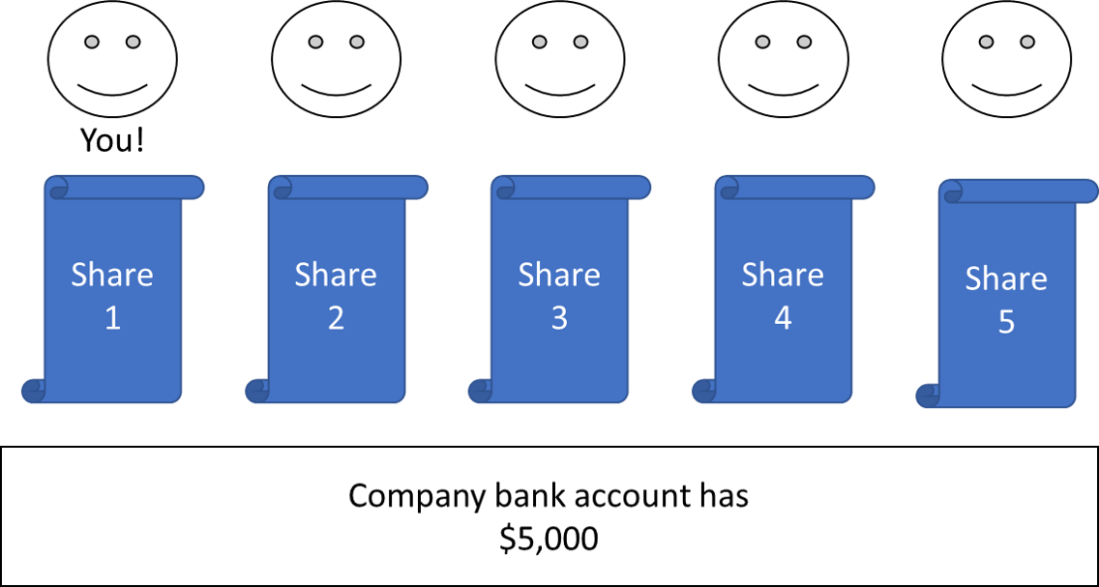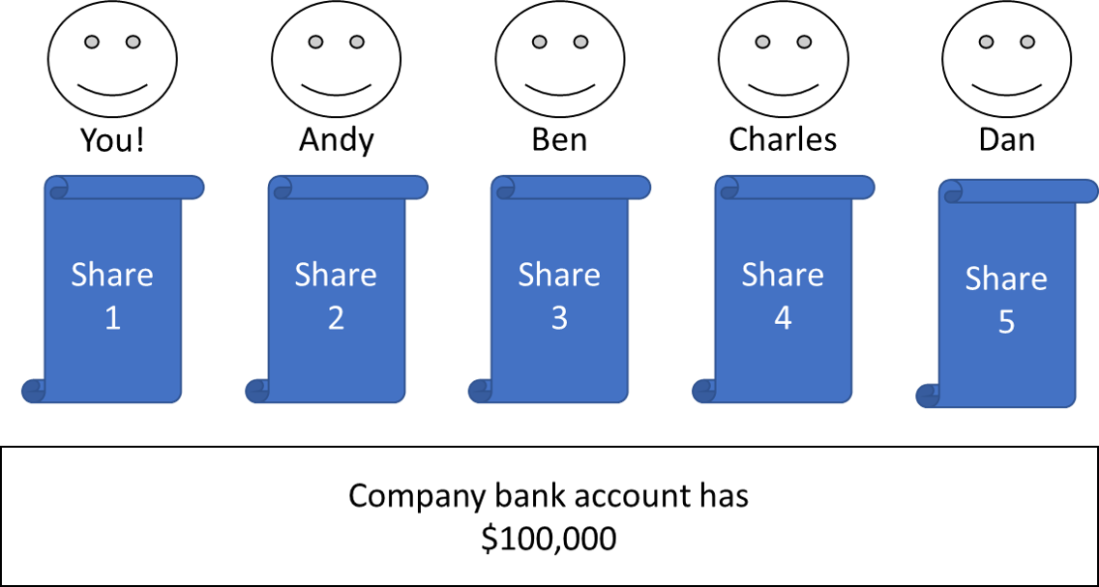In the course of buying stock in companies, you often will have to deal with the complicated question of selling a stock. At the same time, you will definitely encounter scenarios where you run into share splits, share consolidations, bonus shares, share buyback, stock in the form of dividends. Before dealing with these complicated topics, I want to put you through a lesson on company ownership first.
Suppose you wanted to start a fruit stall with your friends. You find 4 other friends to start the business. Each person puts in $1,000 into the new enterprise’s bank account.
Now, you take 5 pieces of paper, and write the words “ABC Fruit Stall” on it. All of you sign the 5 pieces of paper and each person takes 1 piece. This is the birth of ABC Fruit Stall shares. How much is each share worth? If you answered $1,000, you are roughly correct.

Since there are 5 shares of ABC Fruit Stall in existence and you hold 1, you own 20% of ABC Fruit Stall.
Your share of the money
$5,000 x 20% = $1,000
So the piece of paper you hold is worth roughly $1,000. Roughly because in 1 year’s time, it will generate some profits or potential losses, so you cannot say for sure.
5 of you start working hard to grow the company. You have a very successful business, and 1 year later, the company has earned a lot of money!
One day, your neighbor, uncle Tom came along and asked how well your business was doing.
“We put in $1,000 each among 5 shareholders 1 year ago. Today, we have earned quite a bit!” you answer.
Uncle Tom was envious that you have a great business. He makes an offer suddenly. “I would like to buy your share in the company! Since it is profitable, I will give you $10,000 for your share!”
It seems like a great offer. Of course, you put in only $1,000 at the start of the year. You will profit $9,000 straight! Should you sell your share to him? It turns out the decision to sell or hold is not a gut feeling question. There is a mathematical method to figure out what a good price it. Let’s take a look at the company’s financial situation again.

You know the piece of paper is worth 20% of the company. You look at the company’s bank account and realized there is $100,000 inside. Remember, this piece of paper is a proportional ownership of the business.
Your share of the money
$100,000 x 20% = $20,000
You do some calculations and you realize you own $20,000 of that bank account. This piece of paper must be worth $20,000! So Uncle Tom’s price for you is way too low. You reject him. However, Uncle Tom isn’t about to give up. He gets your friends to sit down together and gives them the same offer.
“I will pay any of you $10,000 for your share in the business!” Uncle Tom declared. Your friends don’t know anything about finances, but they start thinking how they can profit straight away from their “buying price” of $1,000.
“Wow! I can profit $9,000 straight! Not bad for 1 year!” Dan exclaimed. He took up the Uncle Tom’s offer straight away. Uncle Tom hands over $10,000 of cash to Dan and Dan proceeds to pass Uncle Tom his piece of ABC Fruit Stall share.
At this point, you are a little confused. Uncle Tom was about to leave, when Charles and Ben suddenly said they would like to sell their shares as well. “We would like the same offer as well!” they declared.
Unfortunately, Uncle Tom looked at his stash of cash and said he was low on funds. “I only have $9,000 left,” he opened his wallet and showed them. “How about this? I will buy one for $9,000?” At this point, something really surprising happens. Andy, Ben and Charles start undercutting to get their hands on the money straight away! They are really scared that the deal disappears.
“I will give it to you for $9,000!” Ben exclaimed.
“I will give it to you for $8,500!” Charles shouted.
“I will do it for $8,000!” Andy, Ben and Charles are now in a full blown panic and jostling with each other to sell before the price fell even further. “Why would I want to buy it if it keeps falling? There must be something wrong!” Uncle Tom exclaimed.
I would like to cut the story at this point and ask you a question.
Do the actions of Andy, Ben and Charles make sense? Should you sell a share just because the last transacted price fell rapidly?
In short, no, your friends were making a terrible mistake. They wanted to profit from selling their share in the company, and when they saw the price start dropping, they panicked and thought the value of the paper dropped.
Each piece of paper is worth $20,000 in the bank. If you were smart, here’s what you should do.
- Go to your parents and borrow $40,000 from them.
- Offer your 3 friends the money they were jostling to sell for, $9,000 each. Total spent $27,000.
- Tell Uncle Tom, you can give him an instant profit by buying him out for $13,000. He gleefully agrees and think you are stupid. “I made $3000 with 1 transaction in 1 day!” he thinks to himself.
- Now you hold 5 pieces of paper. You owe your parents $40,000. You go to the bank with these 5 pieces of paper. They see that you are the sole owner of ABC Fruit Stall now so they let you redeem the full cash account of the company, $100,000.
- You pay off your parents and now have $60,000 left over. Total profit, $59,000.
There are 3 morals to this story.
Moral 1: Value Is Not The Same As Price
Just because people tell you a diamond rock has a price tag does not mean it has any value at all. Just because a McDonald’s meal is cheap does not mean it has no value. Similarly, the pieces of paper representing the company were traded for a falling price, but that does not mean its inherent value is falling.
Whenever you see the price of bitcoin, an apartment, or a penny stock shooting to the moon, remember this short story about ABC Fruit Stall. Are the underlying business conditions changing? Did the company/apartment/currency undergo a change in the value it can create? If you cannot answer the question, it is best to not take part in the madness.
ABC Fruit Stall’s traded price went from $10,000 (Dan sold to Uncle Tom) to $9,000 (you bought from Andy, Ben and Charlie), to $13,000 (Uncle Tom to you).
From the lowest to highest point, the stock price moved more than 40%. That does not mean anything at all to the inherent value of the stock. As an intelligent investor, you will be waiting in glee when the stock falls but the inherent worth stays the same.
Moral 2: Owning A Share Is The Same As Owning The Company
When I hear my relatives buying shares in company X and then bashing company X on social media, I am very baffled. Why are you destroying the value of your own company by creating negative publicity?
If you buy a stock, you are a small owner in a giant company. The price moving up and down is just some Bens, Charlies, Dans and Uncle Toms trading between themselves. Your friends and Uncle Tom didn’t even bother to check the bank account that they partially own when they started trading their share in the business. Never forget this detail.
It is NOT the same as buying a lottery ticket. It is a real voucher that lets you have a claim on the profits of the company it represents. If you buy enough of these vouchers to have a major say in the company, you can even start firing the CEO.
Moral 3: Understand The Business Before You Invest
In ABC Fruit Stall’s case, a simple look at the bank account would let you understand that the paper shares were very under-valued and a smart investor can swoop in and buy up all the shares and make a ton of money. However, real businesses are a lot more complicated.
In order to invest in single company stock properly, you better pick up accounting. If you don’t even understand the language of money, there is no way you will be able to identify that the stock price is mispriced, whether there is any value in the balance sheet and problems in the income statement and company cash flow. Pick up accounting before investing.
On top of accounting, you have to read about the industry that the company operates in. Understand how firms make money in the industry, and understand the risk factors.
If you don’t do either of the steps above, you are not investing. You are gambling. Look around you today. How many of your peers, relatives, colleagues gamble their money away? Do not be like them. Be like this guy.
One thought on “A simple perspective to buying stocks”